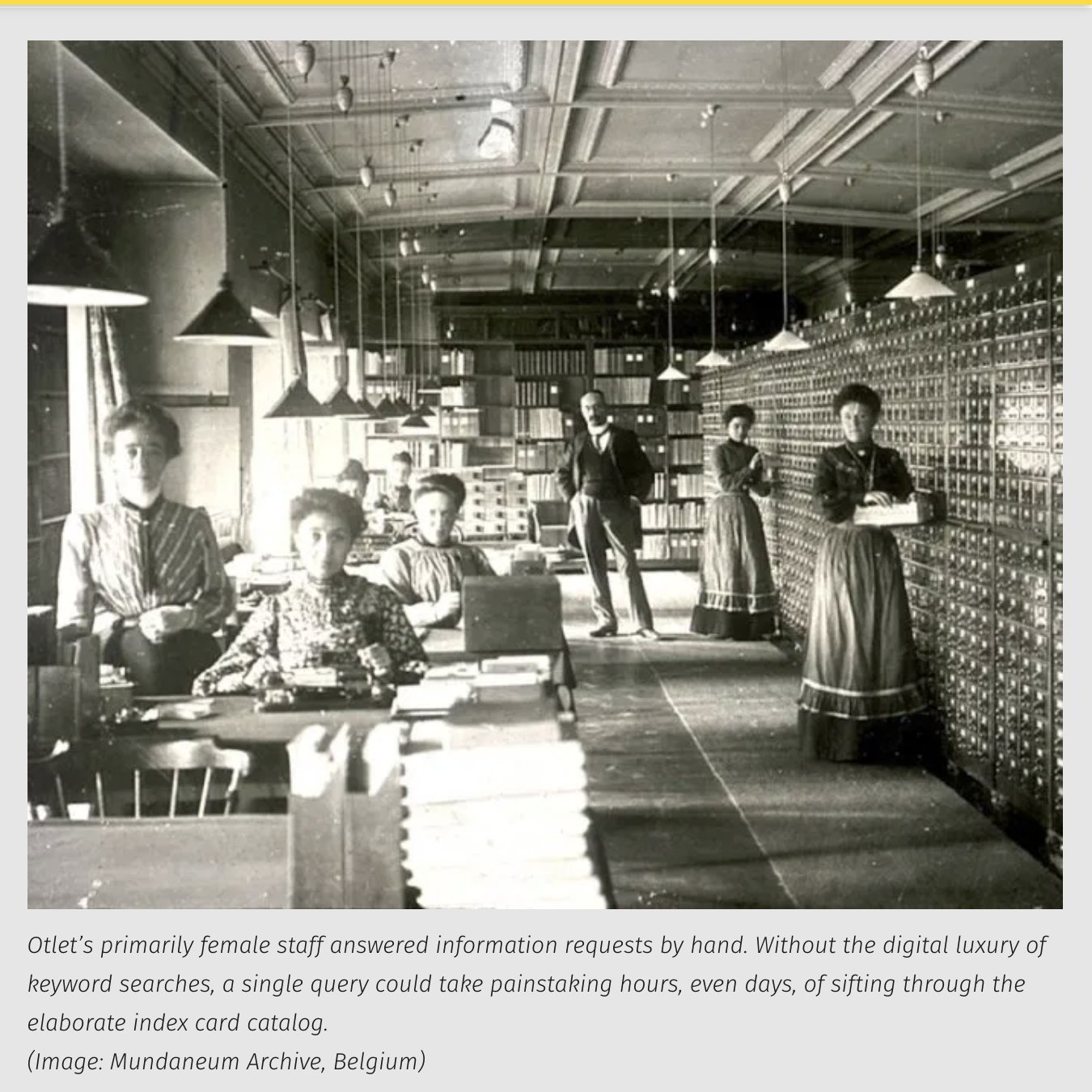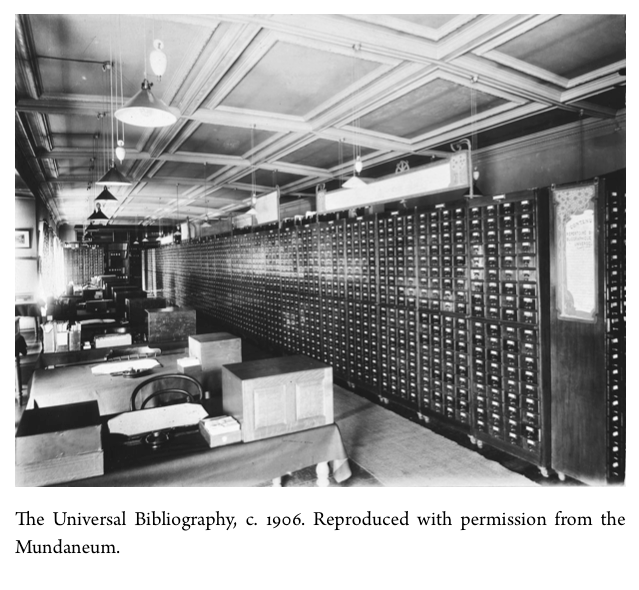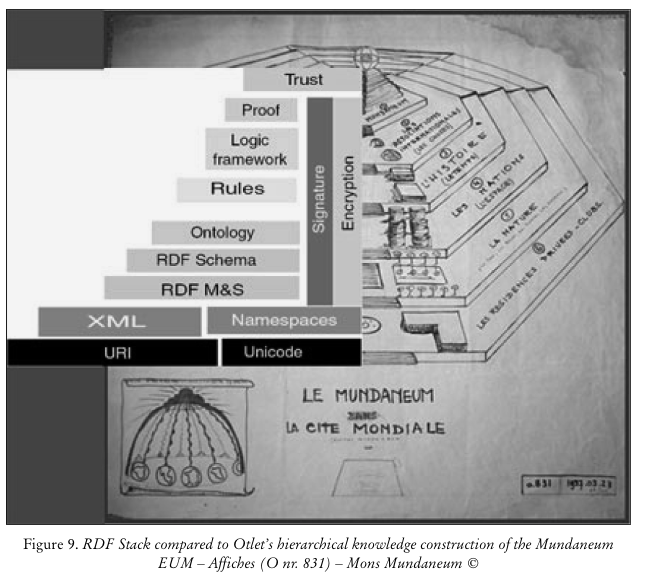Cataloging the World: Paul Otlet and the Birth of the Information Age
30 Oct 2021 02:15 - 16 Dec 2022 12:22
- review of the book by Alex Wright
- Other reviews
- Cataloging the World: Paul Otlet and the Birth of the Information Age
- Introduction
- Otlet's vision of world peace
- Timeframe: this was before digital of course, but not that long before.
- A tragic story of a man too far ahead of his time
- Ch 1 The Library of Babel: pulls back to the 16th century
- Conrad Gessner's system of notes
- Diked from PICI preso
- Lineage of Information Visionaries
- Tim Berners-Lee (WWW, 1989)
- Ted Nelson (Hypertext, __Computer Lib/Dream Machines__ (1974))
- Doug Engelbart (NLS, Augmenting Human Intellect: A Conceptual Framework (1962))
- Vannevar Bush (Memex, As We May Think (1945))
- Otlet ???
- Dewey, Diderot, Bacon, Aristotle
- Timeframe: this was before digital of course, but not that long before. 1900-1940.
- Age of grand museums and World Fairs.
- Institutions ofiInternational collaboration forming.
- General information explosion
- Radio and early telephony was the state of the art in media technology
Twenty-five years before the first microchip...fifty years before the first web browser, Paul Otlet had envisioned something very much like today's Internet.he
- Otlet's story
- Belgian
- Obsessed with museums and cataloging at an early age
- Visions of interconnected information
- Globalist institutions of cooperation and peace were an integral part of what he was doing
Everything in the universe, and everything of man, would be registered at a distance as it was produced. In this way a moving image of the world will be established, a true mirror of his memory. From a distance, everyone will be able to read text, enlarged and limited to the desired subject, projected on an individual screen. In this way, everyone from his armchair will be able to contemplate creation, in whole or in certain parts.
- 1892: "Something about bibiliography"
books were an inadequate way to store information, because the arrangement of facts contained within them was an arbitrary decision...
- instead he proposed
would be cards containing individual "chunks" of information, that would allow "all the manipulations of classification and continuous interfiling." In addition would be needed "a very detailed synoptic outline of knowledge" that could allow classification of all of these chunks of data.
- Timeline
- founded the Institut International de Bibliographie (IIB) in 1895, later renamed as (in English) the International Federation for Information and Documentation (FID).
- 1896 - builds the first search engine (by mail, they did 1500 queries/year)
- Something about bibliography
- Belgium
- Library Science
- The Mundaneum
a current, ever-expanding repertory of knowledge, without any of the drawbacks of the encyclopedia in book form, which is obsolete on the of publication (Berwick Sayers, a visiting librarian, p 160)
- Union of International Associations
- Post WWI, League of Nations
- Hosted a Pan-African Congress in 1921, with WEB DuBois
- Mundaneum
the dream of a global intellectual bureaucracy, providing an archiatactural infrastructure for combining the output of intenational organizations... (p 177, paraphrased)
- Centralized vs Decentralized Ontologies
Otlet recognized that emerging communication networks were shrinking the effective distances between organizations of all stripes—including nations—and that this technological transformation might serve as the catalyst to global geopolitical change. ...The old transnational alliances were becoming outdated, while an increasingly networked system of transport, postal services, and electric signals were facilitating an unprecedented exchange of people, goods, and ideas—all contributing to the formation of a new worldwide economy. (p 149)
Such an undertaking would require more tahn librarians. It would call for a new breed of professional, what Otlet called a "documentalist" (p97, +++)
The structure of the museum reflected Otlet's fascination with Geddes's ideas about exhibits. The Scottsman;s work offered a path beyond mere classification; it represented a new way of thinking about the spatial representation of knowledges. (p119, +++)
Instead of presenting a single, authoritative curatorial v iew of the collection, the encyclopedia [AUM] would allow users to customize their own interactions with it...in short, he envisioned the EUM as an interactive knowledge space (p193, +++)
- Otlet published three books in his later years, and many articles, including "Cosmo-Meta-Political Law" (!) and The Treatise on Documentations, which is an exhaustive history of written media.






